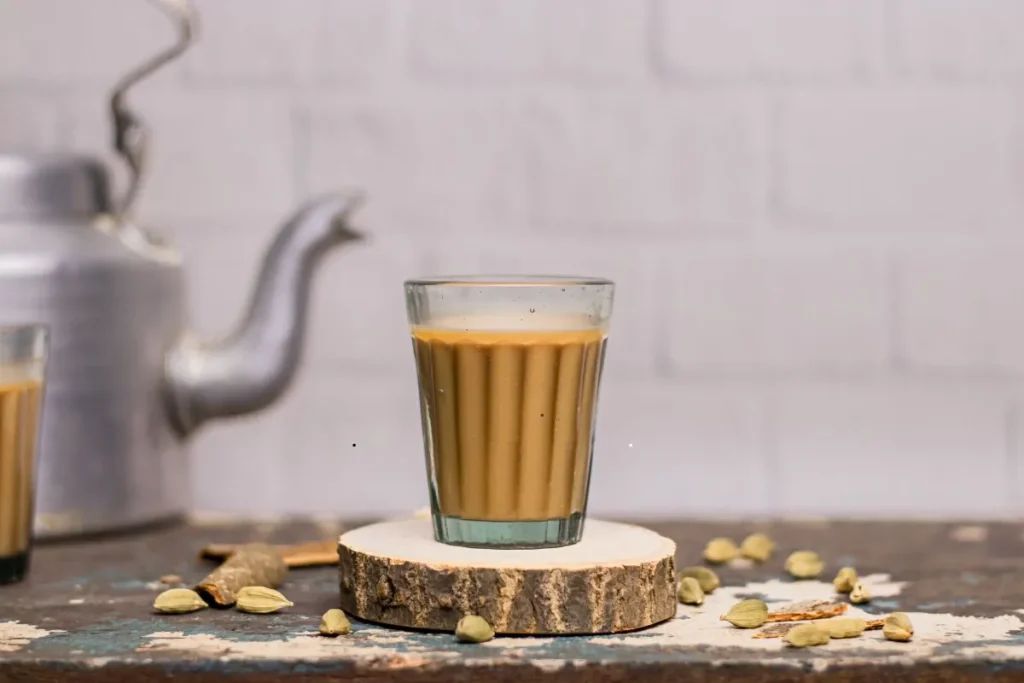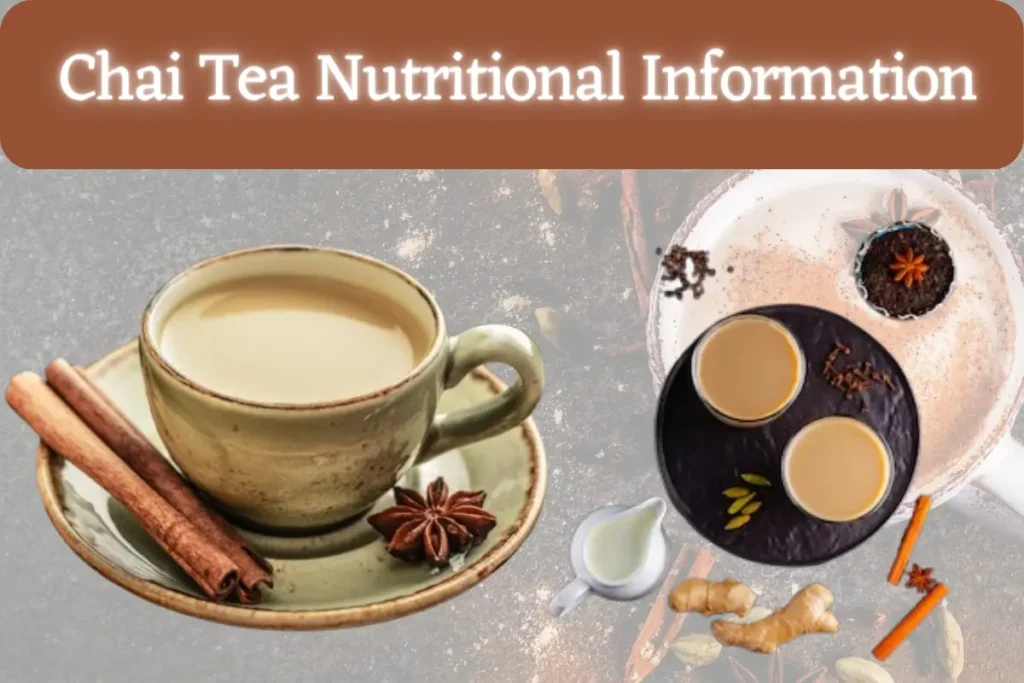Chai tea, originating from India, has become a beloved beverage globally, cherished for its aromatic spices and rich flavor profile. This classic tea offers a comforting and decadent cup of joe. Black tea leaves are brewed with a mixture of spices, milk, and sugar.
But a common question arises all the time: How Much Caffeine Does Chai Tea Have? Let’s dive into this topic in the article.
Importance of Knowing About Chai Tea
Chai tea, a spiced and vibrant beverage with roots in India, has gained global popularity for its warmth, flavor, and perceived health benefits. While the specific ingredients in chai blends can vary, the core component is black tea, which naturally contains caffeine.
Understanding the caffeine content in your chai is beneficial for several reasons.
Firstly, caffeine acts as a stimulant, affecting alertness, mood, and concentration. For those seeking an energy boost, chai can offer a gentler pick-me-up compared to coffee. However, knowing the caffeine content is crucial for individuals sensitive to caffeine who may experience anxiety, jitters, or sleep disturbances from excessive intake.
While typically containing less caffeine than coffee, the amount in chai tea can vary significantly based on factors such as the type of tea leaves used, brewing time, and the ratio of tea to water and spices.
Those with caffeine sensitivity, pregnant or breastfeeding women, and individuals with certain medical conditions should limit or avoid chai tea, as caffeine intake needs to be monitored. Consulting with a healthcare professional is always recommended for specific dietary guidance.
Is Chai Tea Caffeine Free?
Traditional chai tea does contain caffeine because its foundation is black tea, a naturally caffeinated ingredient. While a cup of chai typically has less caffeine than a similar serving of coffee, the amount can still impact those sensitive to this stimulant.
The exact caffeine content in your chai depends on several factors. The specific type of black tea chosen, how long it’s brewed, and the proportions of spices to tea leaves all play a role in the final caffeine concentration.
How Much Caffeine Does Chai Tea Have?
A standard 238g (approximately 8 oz) cup of chai tea contains around 47.4mg of caffeine, but keep in mind this can fluctuate across different blends or brewing practices.
Chai Tea Variants and their Caffeine Content
Here are some popular variants of chai tea:
Traditional Masala Chai
The classic, deeply spiced blend originating in India. Made with black tea, ginger, cardamom, cinnamon, cloves, and often black pepper, masala chai offers a moderate amount of caffeine. An 8-ounce serving can contain anywhere from 25-55mg, though this can increase with longer steeping times.
Dirty Chai
This twist on the classic adds a shot of espresso to masala chai. Due to the coffee addition, dirty chai delivers a significantly higher caffeine kick than traditional versions. Depending on the espresso used, caffeine can range from 90-150mg (or more) per cup.
Caffeine-free Chai
For those looking to enjoy the warming spices without the stimulant effects, caffeine-free chai options exist. These commonly use caffeine-free rooibos as a base, which offers earthy notes similar to black tea. Other caffeine-free bases can include honeybush or a blend of herbs tailored to mimic chai’s spice profile.
Green Tea Chai
A lighter, grassier variation where green tea replaces black tea. Due to the lower caffeine content in green tea, this version generally has around 30-50mg of caffeine per cup.
Chai Latte
Popularized in coffee shops, chai lattes often use a pre-made concentrate or powder base with added milk. The specific concentrate or powder determines the caffeine content, but it’s usually lower than traditional chai due to dilution by the milk. Caffeine estimates can range from 20-70mg depending on the recipe and serving size.
List of Ingredients in Chai Tea

Here’s a list of common ingredients found in traditional chai tea:
Core Ingredients
- Black Tea: The heart of chai tea, providing a robust flavor base and the characteristic caffeine content. Popular choices include strong, malty Assam teas for their boldness or brighter, more brisk Ceylon teas for balance. Loose-leaf tea is ideal for the most nuanced flavor, but tea bags can also be used.
- Spices: The soul of this flavorful beverage!
- Ginger: Offers a warming, slightly spicy element that invigorates the senses. Fresh ginger, peeled and sliced, is always best for maximum flavor, but dried ground ginger can be used in a pinch.
- Cardamom: Imparts a sweet, aromatic, and almost floral character to the chai. Seek out whole green cardamom pods, gently crush them to release the seeds, and use both pods and seeds for the fullest flavor.
- Cinnamon: Brings in the classic chai warmth and a gentle sweetness. Cinnamon sticks provide the most depth, but ground cinnamon can also be utilized.
- Cloves: Contribute a distinct pungency and a subtle hint of sweetness to balance the other spices. A small amount of whole cloves goes a long way.
- Black Peppercorns: Just a touch of black pepper adds dimension and a subtle spicy bite, enhancing the overall flavor profile without being overpowering.
Optional Additions
- Other spices: Chai offers endless possibilities for customization. Experiment with additions like:
- Fennel seeds: Impart a sweet, licorice-like note.
- Star anise: Offers a warm, licorice-like flavor with subtle spicy undertones.
- Nutmeg: Adds warmth and a hint of sweetness. Freshly grated nutmeg is ideal.
- Milk: Traditional chai recipes often call for whole milk for a creamy and rich texture. However, the world of plant-based milk opens up more options! Consider almond, soy, oat, or other milk alternatives to suit your preferences.
- Sweetener: Chai has a natural sweetness from the spices, but adjust to your liking. Sugar, honey, maple syrup, or other sweeteners can be added to achieve your desired level of sweetness.
Chai Tea Nutritional Information

A 238g serving of chai tea is very low in calories, with only 4.9 kcal. It contains a negligible amount of fat (0.1g) and offers no saturated, trans, polyunsaturated, or monounsaturated fats. Additionally, it has zero cholesterol and a minimal amount of sodium (0.8mg).
In terms of carbohydrates, it has 1.4g total carbohydrates, of which 0.3g comes from dietary fiber. There are no sugars present in this chai tea serving. It contains a very small amount of protein at 0.1g.
Regarding vitamins and minerals, this serving offers trace amounts of calcium (5.9mg) and iron (0.1mg) and a small amount of potassium (57.7mg). There is no vitamin D present. Importantly, this serving of chai tea does contain 47.4mg of caffeine.
| Nutrition Facts | Amount Per Serving |
| Serving Size | 238g |
| Calories | 4.9 kcal |
| Total Fat | 0.1g (0% DV) |
| Saturated Fat | 0g (0% DV) |
| Trans Fat | 0g |
| Polyunsaturated Fat | 0g |
| Monounsaturated Fat | 0g |
| Cholesterol | 0mg (0% DV) |
| Sodium | 0.8mg (0% DV) |
| Total Carbohydrates | 1.4g (1% DV) |
| Dietary Fiber | 0.3g (1% DV) |
| Sugars | 0g |
| Protein | 0.1g |
| Vitamin D | 0mcg (0% DV) |
| Calcium | 5.9mg (0% DV) |
| Iron | 0.1mg (1% DV) |
| Potassium | 57.7mg (1% DV) |
| Caffeine | 47.4mg |
Alternatives to Chai Tea and their Caffeine Content
Here are some alternatives to chai tea for those looking to explore different beverage options:
Rooibos Chai
Rooibos, a naturally caffeine-free South African red bush, forms the heart of this chai variation. It offers a similar earthy, mellow flavor to black tea, making it a seamless base for the classic chai-style spice blend.
Herbal “Chai” Blends
Explore blends featuring warm, comforting spices like ginger, cinnamon, cardamom, and cloves, without any actual tea base. These options can be made with various herbs like chamomile, peppermint, or even fruit infusions.
Golden Milk (Turmeric Latte)
This ancient Ayurvedic beverage focuses on the anti-inflammatory power of turmeric and other warming spices like ginger and black pepper. It’s naturally caffeine-free and can be a soothing evening choice.
Chicory Coffee
With roasted chicory root as its base, this beverage boasts a taste reminiscent of coffee but provides zero caffeine. It can be blended with spices to create a chai-like experience.
Green Tea Chai
By using less-caffeinated green tea instead of black tea, you can create a lighter version of chai that still delivers a caffeine boost. Expect around 29.4mg of caffeine per cup (245g).
Matcha Latte
Matcha Tea Latte is a smooth and creamy beverage that is sweetened just right and served with steamed milk. It is a popular choice for those who enjoy the unique flavor of matcha and are looking for a beverage with a moderate amount of caffeine (30mg per 8 fl oz serving).
Yerba Mate
This South American beverage has a naturally stimulating effect due to its caffeine content, along with other compounds that provide a smoother energy boost than coffee. Combining it with chai-style spices can make for an interesting and less jittery alternative. (Caffeine content can vary depending on the type and preparation of yerba mate).
| Beverage | Caffeine Content |
| Rooibos Chai | Caffeine-free |
| Herbal “Chai” Blends | Caffeine-free |
| Golden Milk (Turmeric Latte) | Caffeine-free |
| Chicory Coffee | Caffeine-free |
| Green Tea Chai | About 29.4mg per cup (245g) |
| Matcha Latte | 30mg per 8 fl oz serving |
| Yerba Mate | Varies |
Recommended Daily Intake of Chai Tea
How Much Caffeine Does Chai Tea Have? A standard 238g serving of chai tea contains approximately 47.4mg of caffeine. For perspective, the RDI of caffeine for healthy adults is set at about 400mg. This means that a single cup of chai provides roughly 11.8% of your recommended daily caffeine allowance.
Compared to other popular caffeinated beverages, chai tea falls in the moderate range. It offers a less intense caffeine boost than coffee, making it a good choice for those who enjoy the stimulating effects of caffeine without wanting the potential jitters or restlessness associated with higher doses. However, it’s still important to be mindful of your overall caffeine intake throughout the day, especially if you have multiple cups of chai or consume other caffeinated drinks.
Conclusion
While chai tea can be a delicious and enjoyable beverage, it’s crucial to be aware of its caffeine content. Traditional chai made with black tea does contain caffeine, although typically at lower levels than coffee. If you’re looking for a caffeine-free option, rooibos chai or herbal-based “chai” blends provide similar warming spices without the stimulant effect.
If you are sensitive to caffeine or need to limit your intake, consider factors like the type of tea, brewing time, and ingredients when choosing your chai. As with any caffeinated drink, moderation is key, and understanding your tolerance levels will help you enjoy chai tea responsibly and mindfully.
Frequently Asked Questions:
Q1: What is in a chai tea?
Traditional chai tea originates from India and is a unique blend of black tea and a variety of warming, aromatic spices. The core spices typically include ginger, cardamom, cinnamon, cloves, and black pepper. These spices are often gently bruised and simmered with the tea leaves to release their full flavor. Milk and a sweetener, such as sugar or honey, are frequently added to create the final, creamy, and comforting beverage.
Q2: How healthy is chai tea?
Chai tea made with whole spices offers potential health benefits due to the antioxidant and anti-inflammatory properties found in those spices. Ginger, cinnamon, cardamom, and cloves all contain compounds that may help support digestion, reduce inflammation, and offer other potential wellness perks. However, it’s important to be mindful of heavily sweetened varieties, as excess sugar can counteract any positive effects.
Q3: Why is it called chai tea?
The word “chai” simply means “tea” in Hindi and several other languages. Therefore, when you say “chai tea”, you’re essentially saying “tea tea”. The term became popularized in the West, likely to differentiate this spiced tea blend from other plain black tea varieties.
Q4: Is chai tea always caffeinated?
Traditional chai tea made with black tea does contain caffeine, as black tea naturally has caffeine in its leaves. However, caffeine-free versions are widely available and delicious! These variations often use rooibos, a naturally caffeine-free South African red bush, as a base or focus on purely herbal blends that mimic the warming spice profile of traditional chai.
Q5: Does adding milk to chai tea affect its caffeine content?
Adding milk to chai tea doesn’t change the actual amount of caffeine in the overall beverage. However, it does dilute the caffeine concentration per serving. Think of it like adding water to a strong cup of coffee – it becomes less potent, though the total caffeine remains the same.

Rossi Glover, the passionate Owner of Grand Lake Coffee, infuses every cup with her love for coffee and dedication to quality. With an extensive background in the art and science of coffee, Rossi is not just a connoisseur but a storyteller, sharing the intricate tales behind each brew.

